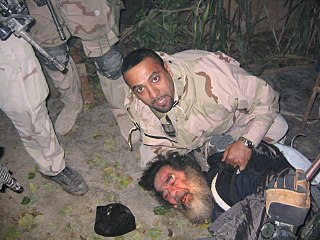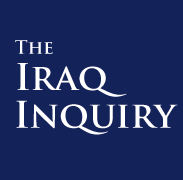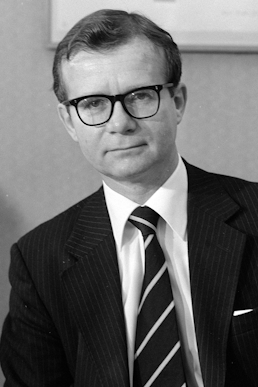
Simon Webb, CBE (born 21 October 1951) is a British civil servant.

Simon Webb, CBE (born 21 October 1951) is a British civil servant.
Webb joined the civil service in 1972, serving with the Ministry of State and with the Treasury. From 1985 to 1988, he worked on naval matters at the Ministry of Defence. [1]
In the early 90s, Webb held a position at the British Embassy in Washington.
Between 2001 and 2004, Webb served as Policy Director at the Ministry of Defence. [2]
Webb gave evidence to The Iraq Inquiry in November 2009. [3]

Tariq Aziz was an Iraqi politician who served as Deputy Prime Minister (1979–2003), Minister of Foreign Affairs (1983–1991) and a close advisor of President Saddam Hussein. Their association began in the 1950s when both were activists for the then-banned Arab Socialist Ba'ath Party. He was both an Arab nationalist and a member of the Chaldean Catholic Church.

The 2003 invasion of Iraq was the first stage of the Iraq War. The invasion began on 20 March 2003 and lasted just over one month, including 26 days of major combat operations, in which a United States-led combined force of troops from the United States, the United Kingdom, Australia and Poland invaded the Republic of Iraq. Twenty-two days after the first day of the invasion, the capital city of Baghdad was captured by coalition forces on 9 April after the six-day-long Battle of Baghdad. This early stage of the war formally ended on 1 May when U.S. President George W. Bush declared the "end of major combat operations" in his Mission Accomplished speech, after which the Coalition Provisional Authority (CPA) was established as the first of several successive transitional governments leading up to the first Iraqi parliamentary election in January 2005. U.S. military forces later remained in Iraq until the withdrawal in 2011.

David Christopher Kelly was a Welsh scientist and authority on biological warfare (BW). A former head of the Defence Microbiology Division working at Porton Down, Kelly was part of a joint US-UK team that inspected civilian biotechnology facilities in Russia in the early 1990s and concluded they were running a covert and illegal BW programme. He was appointed to the United Nations Special Commission (UNSCOM) in 1991 as one of its chief weapons inspectors in Iraq and led ten of the organisation's missions between May 1991 and December 1998. He also worked with UNSCOM's successor, the United Nations Monitoring, Verification and Inspection Commission (UNMOVIC) and led several of their missions into Iraq. During his time with UNMOVIC he was key in uncovering the anthrax production programme at the Salman Pak facility, and a BW programme run at Al Hakum.
Iraq's Weapons of Mass Destruction: The Assessment of the British Government, also known as the September Dossier, was a document published by the British government on 24 September 2002. Parliament was recalled on the same day to discuss the contents of the document. The paper was part of an ongoing investigation by the government into weapons of mass destruction (WMD) in Iraq, which ultimately led to the invasion of Iraq six months later. It contained a number of allegations according to which Iraq also possessed WMD, including chemical weapons and biological weapons. The dossier even alleged that Iraq had reconstituted its nuclear weapons programme.

Saddam Hussein, the deposed president of Iraq, was captured by the United States military in the town of Ad-Dawr, Iraq on 13 December 2003. Codenamed Operation Red Dawn, this military operation was named after the 1984 American film Red Dawn.
The Arms-to-Iraq affair concerned the uncovering of the government-endorsed sale of arms by British companies to Iraq, then under the rule of Saddam Hussein. The scandal contributed to the growing dissatisfaction with the Conservative government of John Major and the atmosphere of sleaze that contributed to the electoral landslide for Tony Blair's Labour Party at the 1997 general election. The whole affair also highlighted the weakness of the constitutional convention of individual ministerial accountability, leading to its codification as the Ministerial Code by the Blair Government.

The Saddam Hussein and al-Qaeda link allegations were based on false claims by the United States government alleging that a secretive relationship existed between Iraqi president Saddam Hussein and the Sunni pan-Islamist militant organization al-Qaeda between 1992 and 2003. U.S. president George W. Bush used it as a main reason for invading Iraq in 2003.

The trial of Saddam Hussein was the trial of the deposed President of Iraq Saddam Hussein by the Iraqi Interim Government for crimes against humanity during his time in office.

Peter Forbes Ricketts, Baron Ricketts, is a retired British senior diplomat and a life peer. He has sat as a crossbencher in the House of Lords since 2016.

Iraq–Israel relations refer to the bilateral ties between the State of Israel and the Republic of Iraq. Due to Iraq's non-recognition of Israel as a legitimate state since the latter's establishment in 1948, the two countries have not had any formal diplomatic relations. The Hashemite Kingdom of Iraq was a part of the Arab coalition that declared war on and invaded Israel shortly after its establishment, sparking the First–Arab Israeli War, and the two states have since then been in a continuous state of hostilities. Iraqi forces also participated in the Third Arab–Israeli War and the Fourth Arab–Israeli War in 1967 and 1973, respectively.

Sir William Charters Patey, KCMG is a British retired diplomat. He was British Ambassador to Afghanistan from 2010 to 2012, and previously served as Ambassador to Sudan, to Iraq and to Saudi Arabia.

The Iraq Inquiry was a British public inquiry into the nation's role in the Iraq War. The inquiry was announced in 2009 by Prime Minister Gordon Brown and published in 2016 with a public statement by Chilcot.

Sir John Anthony Chilcot was a British civil servant.
Fern Britton Meets... is a British television talk show presented by Fern Britton which was first aired on BBC One during the four Sundays of Advent from 29 November 2009 to 17 December 2017. Each episode featured Britton interviewing a high-profile person about their life, career and religious beliefs. The programme attracted particular attention following an interview with former British Prime Minister Tony Blair in which he discussed his thoughts about the 2003 invasion of Iraq.

On April 9, 2003, during the U.S. invasion of Iraq, a large statue of Saddam Hussein in Baghdad's Firdos Square was destroyed by Iraqi civilians and United States Marines. The event received global media coverage, wherein it came to symbolize the end of Saddam's rule in Iraq.
The AWB oil-for-wheat scandal refers to the payment of kickbacks to the regime of Iraqi president Saddam Hussein in contravention of the United Nations Oil-for-Food Humanitarian Programme. AWB Limited is a major grain marketing organisation based in Australia. For much of the 20th and early 21st century, it was an Australian Government entity operating a single desk regime over Australian wheat, meaning it had the sole ability to export Australian wheat, which it paid a single, fixed price for. In the mid-2000s, it was found to have been, through middlemen, paying kickbacks to the regime of Saddam Hussein, in exchange for lucrative wheat contracts. This was in direct contradiction of United Nations Sanctions, and of Australian law.
Douglas Brand OBE is a British criminologist and retired police officer who was tasked with assisting with the establishment of the newly formed Iraqi Police in the aftermath of the 2003 invasion of Iraq.

Major General Timothy Cross, CBE is a retired British Army officer and military logistics expert. He was commissioned in 1971 into the Royal Army Ordnance Corps and went on to serve in Germany, Northern Ireland and Cyprus, interspersed with staff duties and further education. He was posted to Paris in 1984, where he was involved in the development of the MILAN anti-tank weapon, before returning to his regiment as a company commander. He took command of 1 Ordnance Battalion in 1990 and was tasked with running logistics for 1st Armoured Division during the Gulf War. He went on to serve as Commander, Logistic Support for 3rd Infantry Division in 1992.

Lieutenant General Ra'ad Majid Rashid al-Hamdani is a retired Iraqi military officer and former General of the Iraqi Republican Guard, and was one of Saddam Hussein's favourite generals.